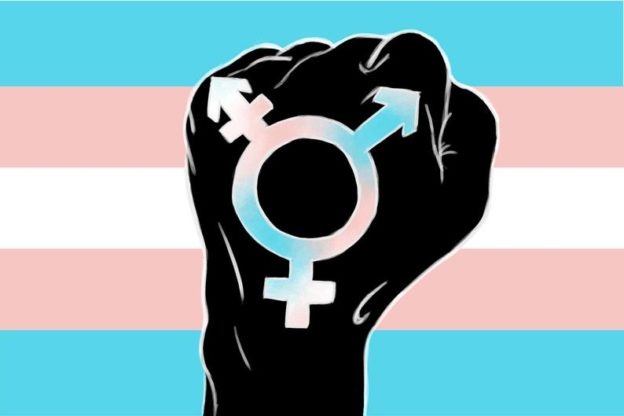Note: The author recognizes that this piece was written on the ancestral, traditional and unceded territories of the Coast Salish peoples, specifically the sḵwx̱wú7mesh (Squamish), sel̓íl̓witulh (Tsleil-Waututh), and xʷməθkʷəy̓əm (Musqueam) nations. It is important to recognize the ways in which settler colonialism has attempted to impose gender binarism and cisheteropatriarchal gender roles. The author would also like to recognize her privileged cis settler positionality and her responsibilities to challenge and fuck with dominant discourses and systems of power and oppression.
It always blows my mind when people call themselves ‘feminists’ but then are exclusionary. If a person purports to believe in equity and equality for all people, then how can they actively exclude trans folks?
You. Are. Not. A. Feminist.
It even bothers me that they get labeled TERFs (trans exclusionary radical feminists) and SWERFs (sex worker exclusionary radical feminists). They ain’t radical. And they ain’t feminists.
Meghan Murphy is one of these folks. Murphy has asked transphobic questions on Twitter, from where she was recently banned, such as: “How are transwomen not men? What is the difference between a man and a transwoman?” She also purposely mis-pronouned a trans woman on Twitter. Murphy claims that trans women have experienced male privilege for most of their lives, failing to acknowledge the nuances in people’s lived experiences, especially with regards to feminine folks. With a proper analysis of intersectional feminism – as coined by Kimberle Crenshaw – it would become clear that trans women experience compounded forms of oppression, also related to race, class, sexuality, ability, age, etc. Murphy also has stated that trans women should not be allowed into ‘safe’ spaces for cis women, as their presence may be triggering to cis women who have suffered male violence. This is echoed by the Vancouver Rape Relief and Women’s Shelter (VRRWS) who are rightfully losing city funding in the near future because of their trans exclusion and their beliefs that there is an essential experience of being born in the body of a woman.
In what ways are the VRRWS and Murphy attempting to police gender and impose essentialist ideas about ‘natural bodies’ and ‘womanhood’?
Murphy also upholds the ideologies of free speech. Sure, yes, absolutely, free speech is important, but when speech dehumanizes people and denies their safety and existence, then freedom of expression does not protect it from warranted critical scrutiny, nor does it supercede those people’s rights to life, liberty, and security. Murphy has denied claims that her views are discriminatory, and has stated that “there’s no hate speech. Trans people are not marginalized because they have control over public discourse.”
Right…
I would like to see some substantive evidence that trans folks have control over public discourse. A 2017 study from the Canadian Institutes of Health Research found that “transgender youth reported high levels of discrimination and violence due to their gender, leading to higher rates of self harm, suicide and suicidal tendencies compared to cisgender youth in Canada.”[1] Furthermore, former provincial NDP-candidate and trans advocate Morgane Oger stated in response to one of Murphy’s talks at the Vancouver Public Library, that “there’s a difference between sharing ideas and inciting discrimination.”
It is crucial that conversations and actions towards feminist allyship and accompliceship include intersectional analyses that highlight responsibility, while also centralizing relationship-building on Indigenous lands. Arvin, Tuck and Morrill assert that decolonial intersectional feminism must build alliances that wholly address difference[2] and actively commit to struggling towards structural change. Instead of being defensive, perhaps the VRRWS, Murphy and their supporters could look at these critiques as “opportunities to develop long-term processes of challenging [their] assumptions about how [people] perform queerness, whiteness, Indigeneity, cisgender privilege, and a whole range of other identities”[3]. Alliance and collaboration work require critical self-reflection and unlearning harmful approaches.
Why do the VRRWS and Murphy continue to uphold exclusionary and transphobic beliefs and policies in 2019?
By ignoring suggestions and criticisms from trans folks, sex workers and supporters, the founders of the VRRWS and Meghan Murphy fail to embody an actuality of feminist liberation and solidarity. Like Chandra Mohanty articulates, in the face of unequal power relations, it is crucial that feminists struggle together through our “common differences” and recognize how these differences can create a basis of deep solidarity.[4] Instead of fracturing ourselves through divisive politics, intersectional feminism demands that we learn how to work together within a framework where a diversity of voices are upheld in order to highlight a “politics of difference”[5]. Working together is challenging and uncomfortable, but that does not mean that certain people – more privileged folks – get to step away from it. Perhaps they could recognize the many privileges they have and refuse to uphold essentialist beliefs about ‘womanhood’, sex work and feminism.
The founders of the VRRWS and Murphy seem to not want to engage in the possibilities of relational coalition-building with others, nor recognize how critical it is to focus on “building feminist solidarities across the divisions of place, identity, class, work, belief, and so on. In these very fragmented times it is both very difficult to build these alliances and also never more important to do so”[6]. The struggle towards new futures and world-making demands an intersectional feminist politics that recognizes the ways in which our differences exist and that these differences can connect us deeply to one another against larger structures of power and oppression.
By denying trans folks safety and support, the VRRWS – propped up by trans exclusive ideologues, such as Murphy – fails to recognize and comprehend the importance of intersectional feminism.
Meghan Murphy will be speaking at UBC this Wednesday, March 27th, sponsored by the UBC Students for Freedom of Expression. There is a teach-in and meetup to counter her talk at the same time:“It has been organized to hold discussions and lectures about specific points that concern Meghan Murphy and the recent outburst of transphobia on campus.”
FB link: https://www.facebook.com/events/338937833410408/
Sources:
Special thanks to editors Nodi Y. and Scott M.




